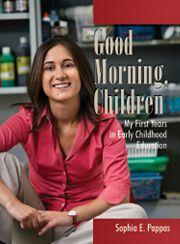
Close Encounters of the Pre-K Kind
April 5, 2010
Related Reading

Good Morning, Children: My First Years in Early Childhood Education
Sophia E. Pappas, 2009
Gryphon House, Inc.
Beltsville, MD
188 pp., ISBN 978-0-87659-078-2
$14.95
So much that’s written about preschool education these days comes from “on high” that we run the risk of forgetting how much it is, at its core, a series of close encounters between teachers and the likes of Kevin the serial anti-sharer, Alan the artistically inclined, and Ali the perpetually dancing cheerleader. In her engaging new book Good Morning, Children: My First Years in Early Childhood Education, Sophia Pappas provides an antidote to that and a window into the world that is her New Jersey Abbott Preschool Program classroom. Along the way, we become acquainted with Kevin, Alan, Ali, and their classmates and more important, what spells success for this teacher and the renowned pre-K program of which she was part.
Motivated by her quest to rectify social inequities, author Sophia Pappas became a member of the Teach For America corps, dedicating three years to teaching preschool in Newark, New Jersey. Before entering the education field, she studied political systems and leaders at Georgetown University and was an intern on Capitol Hill.
Good Morning, Children is a collection of her experiences as a rookie teacher and reflections on her classroom challenges and successes. The book also benefits from perspectives developed during her time as a blogger for Pre-K Now. Throughout her book, Pappas makes a strong case for the importance of supporting high-quality early childhood programs. An underlying theme of accountability on all major players in education – including teachers, directors, and policymakers – prevails. According to Pappas, school districts must have accurate criteria for what effective teachers look like and teachers should play a role in evaluating the curriculum they use.
In Part One, she describes her first-year experiences (and anxieties) of becoming a teacher. She covers a wide breadth of topics through personal narratives, including how she created a safe, inviting and print-rich learning environment, developed a daily schedule respectful of children’s needs, and worked collaboratively with her assistant, and how her preparations, self-reflections, and time with her mentor helped her to assert her leadership.
In Part Two, Pappas unpacks her thoughts and experiences with assessment, planning and instruction. She illustrates the importance of performance-based assessment to fully understand what preschoolers can do and to help inform instruction. Through short vignettes of her interactions with her students, Pappas demonstrates how using age-appropriate teaching strategies and flexibility advanced her students’ growth.
Pappas encourages readers to think about the broader picture. For example, she suggests that teachers think about the skills an average adult, politician or leader would need and begin teaching these skills in preschool. She highlights the importance of using literature to practice conflict-resolution skills. She also gives examples of how to think about the minute details such as what individualized instruction would look like for a particular student. In addition, she provides resources that worked for some of her students, specifically, an individualized action plan and behavior contract.
Good Morning, Children provides insight to all advocates of children’s education with an emphasis on educators. It confirms the importance of starting a solid and appropriate education for 3- and 4-year-olds and seeks to inspire preschool educators to fully grasp the importance of the role they play in providing a rich and comprehensive education through constructive play and differentiated instruction. Sophia Pappas puts heart and soul into sharing her story as an educator. As “a leader on the first line of defense against educational inequity” (p. 15), she gives her students a voice in the ongoing debate over appropriate early childhood education.
Reviewed by Marcie Weber
Early Learning Consultant, NIEER
About NIEER
The National Institute for Early Education Research (NIEER) at the Graduate School of Education, Rutgers University, New Brunswick, NJ, conducts and disseminates independent research and analysis to inform early childhood education policy.
